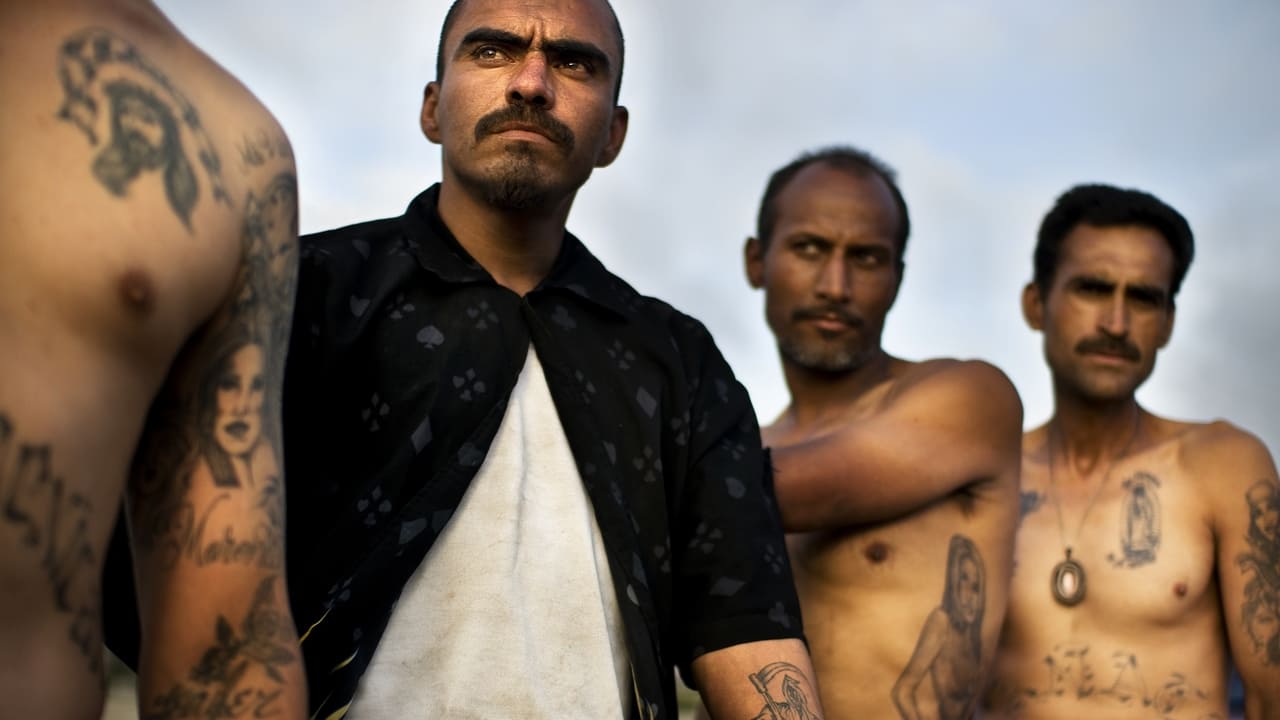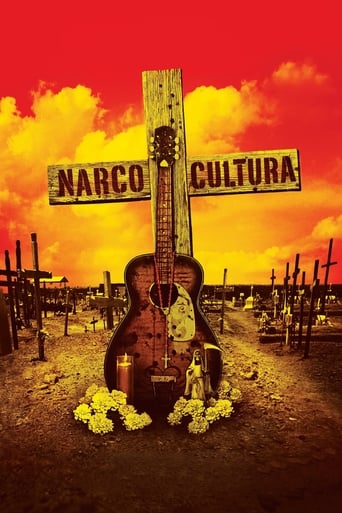



Really Surprised!
A film with more than the usual spoiler issues. Talking about it in any detail feels akin to handing you a gift-wrapped present and saying, "I hope you like it -- It's a thriller about a diabolical secret experiment."
View MoreThere is, somehow, an interesting story here, as well as some good acting. There are also some good scenes
View MoreThere is definitely an excellent idea hidden in the background of the film. Unfortunately, it's difficult to find it.
View More"Everybody wants respect," Quintero. Maybe, but most normal humans have a vastly different definition of this word than the violent morons running loose in Mexico and those who attempt to immortalize them with lousy music.Yet another sad testament to the downfall of Mexico, at least great swaths of it under the control of the drug cartels in which the police are afraid to leave their posts and normal citizens barely have any chance at a life.Before anyone becomes too critical of Quintero, the knucklehead singer of narco-corridos, just think of all of the moronic middle class kids in America who listen to gansta rap and wear Scarface t-shirts. Then you have to keep in mind that many of the guns used in the horrific killings across our border came from the good old U.S. of A. With that said, this kid s particularly stupid and I wish that he could see first-hand just a bit of the violence he glorifies with his crappy music.Besides the damage done by the avalanche of homicides in recent years it would be impossible to calculate the destruction of the values of perhaps millions of Mexican men who have always been terrified of their own lack of masculinity, something almost absent in Spanish men where being a "tough guy" will get you absolutely nowhere.
View More"It smells of blood and death, and 50 meters from here, across the border, no one wants to know what happens, and they shut their eyes. I miss the Juarez where I grew up, where I played. Will it return again? What is the limit? Why go on? But at the same time, here I am, in my beloved Juarez." Another scary-wacky documentary along the lines of the "Act of Killing" from Indonesia. The truth is indeed stranger than fiction. 60,000 dead in Mexico since 2006. It is all taking place so near to the U.S., yet so far away from consciousness for many. Looking across the border recently from El Paso, I tried to imagine what it was like in Juarez. I did not imagine such insanity; palace style graveyards for dealers, broken systems for justice and law enforcement, the perverse glorification of the violence, the extremes people will go to in order to survive, . . .
View MoreEvery American should see this film, even though I think the 'values' it expresses are downright evil. People should see it just to be warned about this disease of violence and murder that is metastasizing on our southern border. As documentary cinema it's pretty good; it follows certain characters who have an intimate involvement of the drug culture and drug trade. There is no narration, just interviews with essentially two main players: one a Mexican CSI investigator, and the other a morally ambiguous songwriter who specializes in 'narcocorridos', songs about the Mexican drug trade and the carnage that goes with it. Narcocorridos exploit sensational stories of murder and violence, naming real events, real drug lords and real victims, and generally casting them in a heroic aura which is far better than these criminal scumbags deserve. Corridos, songs which tell stories, are a venerable tradition in Mexican folk music. Traditionally they have a sweet, lyrical quality, telling tales of Pancho Villa or the revenge of jilted lovers and the exploits of famous bandits. Of late the corrido has taken a darker turn, celebrating the nihilistic deeds and deaths of narcotraficantes and in general glorifying and promoting the culture of trafficking and murder. For this reason narcocorridos have been banned in Mexico as an incitement to violence. And, unavoidably, since the songs often name players, dates and locations the bands themselves become partisans in the drug wars and have become too often the victims of the mayhem they celebrate. The songwriter interviewed in this documentary lives in California and makes his money off the public's fascination with the horrors of the drug trade. His band features, along with the traditional instruments like tuba and accordion, a bazooka, which is shown but not, we must hope, played on stage. Gone are the bittersweet sounds of Los Alegres de Teran or even Los Cadetes de Linares and instead we have musicians with attitude. They seem to be really good musicians but their music is drowned out by the attitude. On the other hand, we also follow a young policeman whose job is to collect forensic evidence from crime scenes after the shootouts between rival gangs. This often involves severed body parts strewn conspicuously about the neighborhood as a message to the other guys. It's an awful, thankless, job because few of the murders are solved and the corruption of the Mexican authorities is epic. He is careful, dedicated and in danger. Policemen in the northern states are killed on a regular basis. This fellow represents the best of Mexican manhood, unlike the locos you see posing with their pistols and their AKs. You get to see what he's up against. He is the real hero, but is anybody going to write a corrido about him? The problem with the drug culture is that is isn't actually a culture, with its traditional values. It is instead the absence of values, the absence of culture, a black hole that threatens to swallow light itself. Santa Muerte is not a real saint. She is the anti-saint. Near the end we see an entire cemetery where the rich drug dealers go when they die (seldom of natural causes). Each mausoleum is like a big ornate church with domes and cupolas and there looks to be a whole city of them. And the windows are glazed with bulletproof glass. The drug culture becomes a parody of itself.
View MoreThis music has become very popular and accepted by a lot of Spanish speaking Americans. Not everyone who speaks Spanish is an illegal immigrant. How bout a review from a non-racist person...I'm am American in South Texas. There is a popular dance club in my area, a very affluent side of town, which my wife and I still visit for the occasional birthday. Recently at midnight, they randomly switched the music to one of these "Corridos" and from a projector played the video on the wall. Everyone sang along and I was totally lost as to what was going on. My wife translated the lyrics and explained to me the origins of the song. Here, hundreds of American's were chanting to the glory of drug kings? It reminded me of growing up in the early nighties when gangsta rap went mainstream. People were eating up the gangsta life and feeding off the passion behind the lyrics. An outlet to voice the emotions for the black youth in inner city neighborhoods was found. Many people nowhere near a ghetto were drawn by this culture and wanted to be apart of the lifestyle. Not realizing there was an actual world of violence and struggle attached to the music, they glorified the drug dealing lifestyle as in the movie "Scarface". Here we are a couple of decades later and we kinda grew up past that lifestyle. Rap music has become more about sustained wealth and mainstream rap (looking at you Jayz)has provided a higher level of status for American youth to bump their heads to. It's I rather be a CEO than push drugs on street corners now. Mexicans and Mexican-American youths didn't have that voice. This documentary shows us the alternate sides of this new outlet. On one side you watch an American singer who is rising in popularity on the heels of drug dealers. On the other side you see a Mexican investigator trying to find meaning in his work..actually living the life. Mixed in you see actual cartel members living "the life" and the suffering of civilians looking for a way out. I especially enjoyed the directors emphasis on the contrast between Mexico and the US. I was born here and my wife was born in Mexico. It truly is hard to grasp the way it must feel to live in absolute fear but yet be able to see with your own eyes "safety" just a few hundred yards away. This was a moving, yet scary unmasking of a neighboring war. This is not only a problem for Mexico and this music isn't only popular with Mexicans. The drug cartels are on a whole other level right now. They are sick, violent people all trying to outdo each other with more and more violent killings. Civilians are being massacred and for the most part they are untouchable. I wonder if the American who is exploiting this lifestyle in the documentary to make money from his songs realizes the repercussions? Or if he even cares...it is the American dream isn't it.
View More